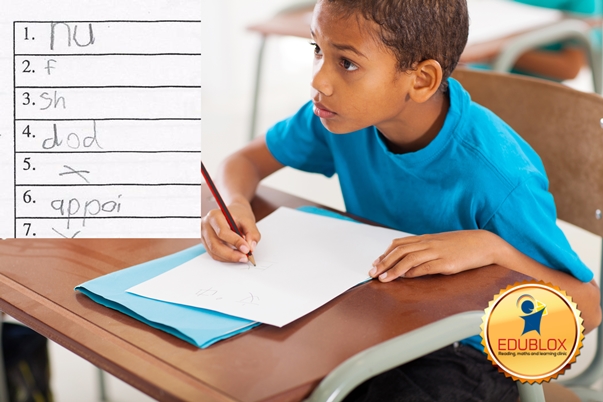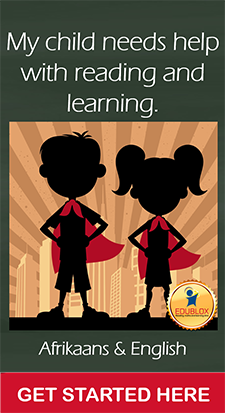

Johnny’s teacher is happy about his performance in reading and maths. She awarded him a 6/7 for reading and a 7/7 for maths on his year-end report. Johnny’s parents should be proud…
The truth is that Johnny’s parents are becoming more and more unsettled. If Johnny’s reading is considered to be good, why is his younger sister’s reading so much better than his? Why does he take so long — sometimes one hour — to write three short sentences? His spelling is atrocious, and he cannot even do basic maths.
We are witnessing more and more Johnnys — struggling learners who receive high marks on their school reports. A few years ago this was nearly unheard of, but now it is becoming more and more commonplace, so much so that we have decided to run a special series on this phenomenon. The stories are told matter-of-factly, without identifying any person or institution.
Meet Peter
Peter completed Grade 2 at a R6000-00 per month private teaching institution that offers tutoring using a well-known CAPS-based curriculum, alongside many forms of therapy. This was Peter’s report at the end of 2016:
Peter assessed at Edublox
Peter was assessed at Edublox Pretoria East at the end of his Grade 2-year on the Essi Reading and Spelling Test. This test aims at determining the sight word vocabulary of a learner, as well as his spelling ability. Norms for the tests, available for each term, have been calculated in the form of stanines and percentile ranks.
Of children doing the test on grade and term level,
4% score a stanine of 1 (VERY POOR)
19% score a stanine of 2 or 3 (POOR)
54% score a stanine of 4, 5 or 6 (AVERAGE)
19% score a stanine of 7 or 8 (GOOD)
4% score a stanine of 9 (VERY GOOD)
Is Peter’s 6/7 for ‘phonics’ justified?
Assessed on the Essi Reading Test, on a Grade 2, 4th term level, Peter scored a stanine of 1 (VERY POOR). He could not read even the easiest of the twenty Grade 2 words, reading “look” as “read”, and “lunch” as “mel”.
Assessed on a Grade 1, 3rd term level, Peter scored a stanine of 1 (VERY POOR). He could read only one of the Grade 1 words, i.e. “box”. He read “she” as “shoe”, “toys” as “tell” and “kitchen” as “car”, etc.
On an informal reading test Peter could read only three words correctly during a one-minute period (that equates to 20 seconds per word):
Assessed on the Essi Spelling Test, on a Grade 2, 4th term level, Peter scored a stanine of 1 (VERY POOR). Here is Peter’s writing of the words “hunt”, “drum”, “ship”, “door”, “stick” and “apple”:
How about Maths?
On his Grade 2 year-end report, Peter did quite well on this maths assessments, scoring one 5/7, one 6/7 and two 7/7’s. Are these scores justified, because here are two examples of simple addition work sheets that he struggled to complete:
How is this possible?
Peter’s case is upsetting, and the only way to start fixing this kind of problem would be to know the cause.
So, is it the CAPS syllabus? CAPS has been under scrutiny since its inception. “The biggest issue I picked up on in the CAPS curriculum is that most subjects jump from topic to topic, with no time for consolidation,” says remedial therapist Marina Goetze. “Very few children are able to cope with the hopping around of concepts. Once again it does not allow for depth of knowledge to form and it confuses any child that has average to below average processing skills. The majority of children need concepts to be consolidated, and not just once.” Is another big issue perhaps that CAPS conceals learning difficulties?
Is it perhaps the school or centre that charges exorbitant fees and therefore wants to look good?
Should we blame Peter’s teacher? The problem is that teachers are part of a bureaucracy with no real control over what to teach and how to teach. Teachers don’t control curricula, standards or testing. They have to make do with whatever materials, worksheets and curricula they are given, even if they believe that they are ineffective.
Perhaps we should blame the ESSI Reading and Spelling Test. This test was standardised on 34,000 South African learners around 1997, which is not old for a reading test, but maybe the world has changed so much over the last two decades that it is no longer valid in a world where SMS language has become the new standard…
One person that is not to be blamed is the child. Here is tutor Bernett Baloyi with Peter, who can already read more than 150 words, after doing cognitive training at Edublox for 40 or so hours.
We will continue to explore and report on this issue. Feel free to post your comments below.











I agree totally with what I just read, I see many many children, there is nothing wrong intellectually, but the teachers rush through the teaching and learning process, my assessment is that there seem to be ignorance on how children learn and develop, how the brain process information, how to introduce concepts or new topics to the learner, it seems teachers think there is only one way or method of teaching or learning and all the children must fit into that method. Government schools, mushroomed private schools, there seem to be money making out of the ignorance of parents, .… Read more »